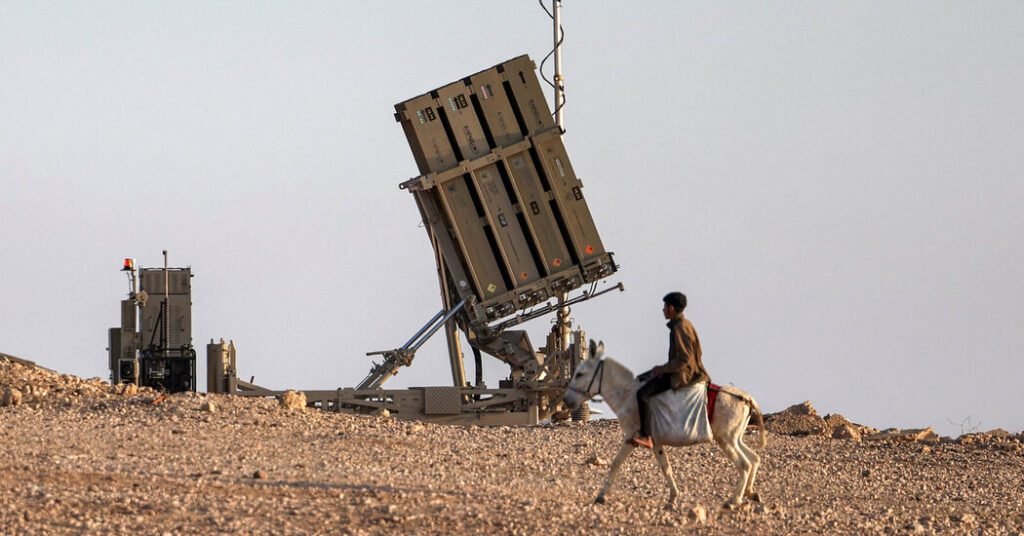For people in eastern Ukraine, where nightly drone barrages from Russia overcome the army’s shaken air defenses, the response of Western allies to Iran’s airstrike against Israel this weekend produced uncomfortable comparisons.
The militaries of the United States, Britain, France and others intervened to help Israel defend against a barrage of more than 300 Iranian drones and missiles, almost all of which were intercepted. A similar number of aerial weapons are launched against Ukraine on a weekly basis, its officials say, with many of the drones in these attacks being designed by Iran and now produced by Russia.
Since the beginning of this year, Russia has launched 1,000 missiles, 2,800 drones and 7,000 guided aerial bombs against Ukraine, according to Ukraine’s permanent representative to the United Nations, Sergiy Kyslytsya. While Washington and other allies have provided Kiev with some powerful air defense weapons, they have not directly engaged Russian forces, and Ukrainian officials have long argued that the weapons provided are insufficient to counter the threat from Moscow.
In the eastern Ukrainian city of Kharkiv, where 1.3 million people live with nightly air raid alerts, many people expressed anger and frustration over the weekend that Ukraine’s allies, wary of provoking Russia, are not giving it the same protection as Israel.
“When rockets fly into Israel, the whole world writes about it,” said Amil Nasirov, a 29-year-old singer. “Here, the rockets are flying and we don’t have American bombers saving the sky like over Israel.”
“It’s very stupid. it’s hypocrisy,” he added. “And it’s like some underestimation of Ukrainian lives.”
Ukraine has been begging since the start of Russia’s full-scale invasion in February 2022 for more tools to close its skies to Russian missiles. But the first Patriot missile systems from the United States and Germany – the only proven defense against ballistic missiles – did not arrive until the spring of 2023.
Ukraine has also requested F-16 fighter jets, which the Biden administration, which must approve any transfers of American-made aircraft, has long resisted providing because of concerns that Moscow would see it as an escalation.
It eventually backed down, but Ukrainian pilots are still training on the systems and are not expected to take to the skies over Ukraine until this summer.
Ukrainian officials noted the role the fighter jets played in Israel’s defense as an indication of their importance in air defense.
President Volodymyr Zelensky said the response to the Iranian attack was clear evidence that “the world has everything necessary to stop any missiles, Shahed drones and other forms of terror,” referring to the Iranian attack drones that were a large part of Russia’s arsenal.
“The whole world is seeing what real defense is. He sees that it is possible. And the whole world saw that Israel was not alone in this defense – the threat in the sky is also being eliminated by its allies,” Mr Zelensky said in his last night speech.
British Foreign Secretary David Cameron said on Monday that while his country had been one of Ukraine’s staunchest military supporters – training thousands of troops and providing tanks and other advanced weapons – Britain would not be able to shoot down Russian drones. aircraft over Ukraine because it could cause inflammation. a wider war in Europe.
“If you want to avoid an escalation in terms of a wider European war, I think the one thing you have to avoid is NATO troops directly engaging Russian troops,” Mr Cameron told Britain’s LBC radio station. “That would be an escalation risk.”
The United States remains the main supplier of ammunition for Ukraine’s best air defense systems. But the last time Congress authorized military aid for Ukraine was in October. In the intervening months, Ukraine’s air defenses have been largely depleted, while Russia has been more successful in using air power to advance to the front lines, attack Ukraine’s energy grid, and inflict more casualties on civilians.
At least 126 people were killed and another 478 injured in Russian raids in March, a 20 percent increase from the previous month, according to the United Nations.
Liubov Sholudko contributed to this report from Kharkiv, Ukraine.

